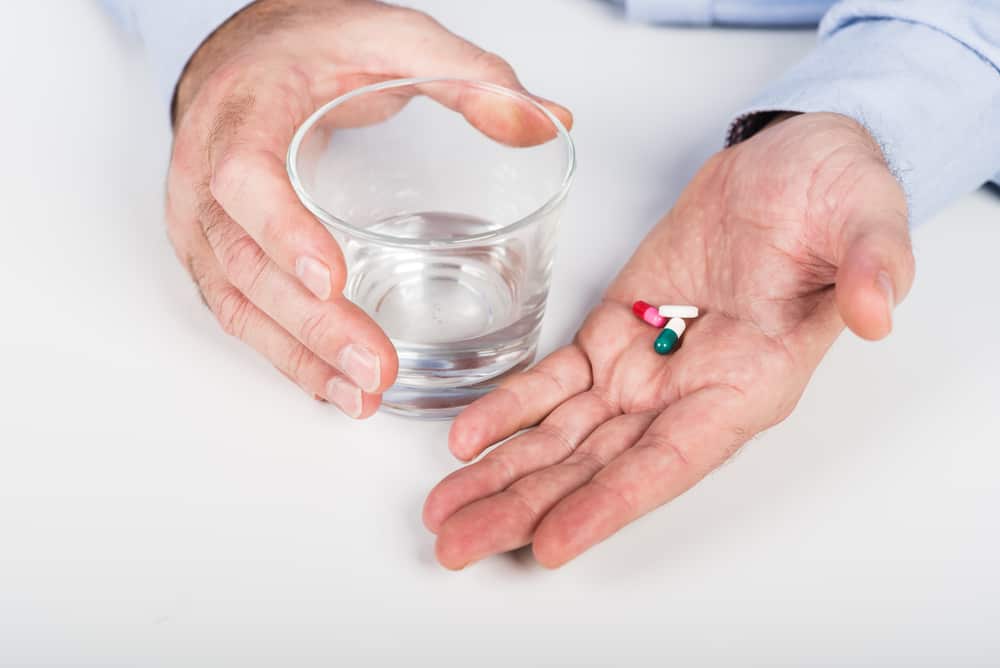Contents:
- Medical Video: Pregnancy Tips : How to Treat Headaches During Pregnancy
- Danger of dehydration in pregnant women
- 1. Low volume of amniotic fluid
- 2. Other health risks
- Signs of dehydration
- 12 glasses of water per day prevents dehydration
Medical Video: Pregnancy Tips : How to Treat Headaches During Pregnancy
Dehydration is a condition where your body lacks fluids. When the water level in your body decreases, the balance of minerals in your body is also disrupted, causing your body's functions to be disrupted. Most of our body consists of water, its main function in addition to maintaining mineral balance is to lubricate joints, eyes, help facilitate digestion and dispose of waste products from metabolism from the body, and maintain healthy skin. Dehydration is usually caused by a lack of fluid intake to replace fluids released by the body. In addition to external factors such as weather and the weight or lightness of physical activity carried out can also increase the risk of dehydration.
Apart from causing mineral imbalances in the body, dehydration can cause a variety of other more serious health problems such as:
- Cerebral edema: When the body has been dehydrated for too long and suddenly gets fluid intake again, the body will draw as much fluid as possible into the body's cells, this can cause cells to swell and break. This kind of event is dangerous especially if it occurs in cells in the brain.
- Seizures: minerals in the body (especially potassium and sodium) play a role in the process of delivering signals between cells. When electrolyte levels in the body are disrupted, signal delivery also experiences interference so that it can result in unconscious muscle contractions. The worst effect is losing consciousness.
- Shock due to low blood pressure: low body fluids can cause a decrease in blood volume. The low blood volume triggers a decrease in blood pressure so that the oxygen flowed through the blood also decreases.
Danger of dehydration in pregnant women
Then what is the impact of dehydration on pregnant women? During pregnancy, fluids play an important role. Not only to regulate electrolyte balance and maintain lubrication function, fluid during pregnancy has additional functions. In the early trimester of pregnancy, maternal blood volume will increase to support fetal development and placental formation. Blood volume is very dependent on body fluid balance. Not only the placenta, amniotic water is also formed from the water that the mother drinks, so it is recommended that pregnant women really pay attention to water intake not to experience dehydration. Some health problems that can be caused if pregnant women are dehydrated, namely:
1. Low volume of amniotic fluid
Amniotic water plays an important role in supporting baby's growth and development. This clear liquid that is slightly yellowish is the place where the baby lives while in the mother's stomach. Amniotic fluid helps the baby to move in the womb, this supports the growth of the baby's bones. In addition, amniotic fluid also functions to maximize lung development, maintain the temperature around the baby, and protect the baby from shock or pressure from the outside. Lack of amniotic fluid is called oligohydramnios, can occur due to old pregnancy, torn membranes, and dehydration.
The low volume of amniotic fluid, especially in the early stages of pregnancy, can cause disruption of fetal development to miscarriage. While in older gestational age, lack of amniotic water can have an impact on premature birth, disability in infants, and complications during childbirth.
2. Other health risks
Fatigue, constipation, and lack of maximum milk production, are some of the health problems caused by dehydration in pregnant women. In addition, water functions to maintain liver and kidney function so that it can continue to work optimally. Lack of water in the body can cause the body to have difficulty removing metabolic waste due to the absence of water to dissolve the remaining metabolism, this can have an impact on the health of the baby's liver and kidneys because they have to work harder.
Signs of dehydration
Signs of dehydration, especially mild dehydration, are often ignored. The easiest way to detect whether you are dehydrated is the presence or absence of thirst. In addition to thirst, signs of mild to moderate dehydration include dry mouth, feeling tired or drowsy more than usual, urinating not as often as usual, dry skin, headaches, constipation, until dizzy or like wanting to faint. While in severe dehydration these signs become more severe, accompanied by low blood pressure, faster heart rate and breathing, fever, and reduced skin elasticity.
12 glasses of water per day prevents dehydration
To prevent dehydration, pregnant women are advised to drink 12 glasses of water per day. This amount can increase if the mother is in hot weather or is experiencing morning sickness, because vomiting and diarrhea can increase the risk of dehydration. More than usual physical activity can also cause the body to lose more fluid so that if pregnant women have physical activity, it is advisable to always pay attention to their fluid intake. But pregnant women are not advised to consume fluids that come from drinks high in sugar and caffeine because this type of beverage is a diuretic so it actually triggers the discharge of body fluids.
READ ALSO:
- Various Dehydration Preventing Fluids Besides Water
- Benefits of Water for Skin Beauty
- What's the Difference between Mineral Water and Plain Water?












